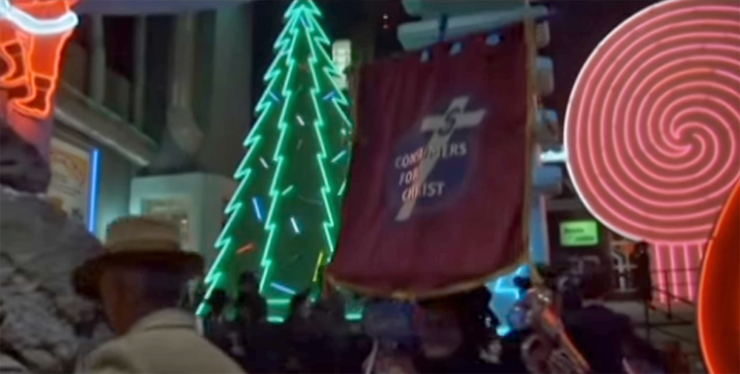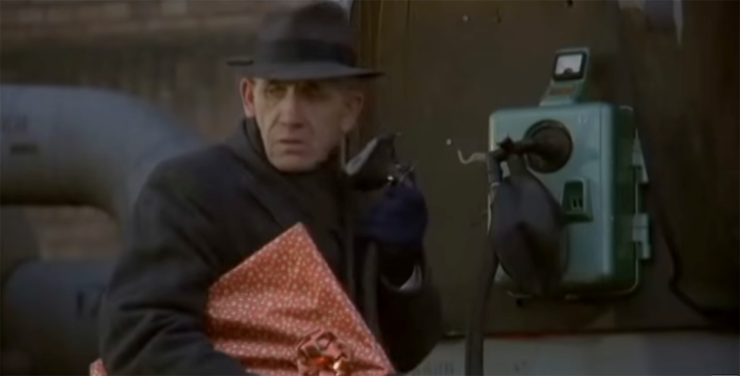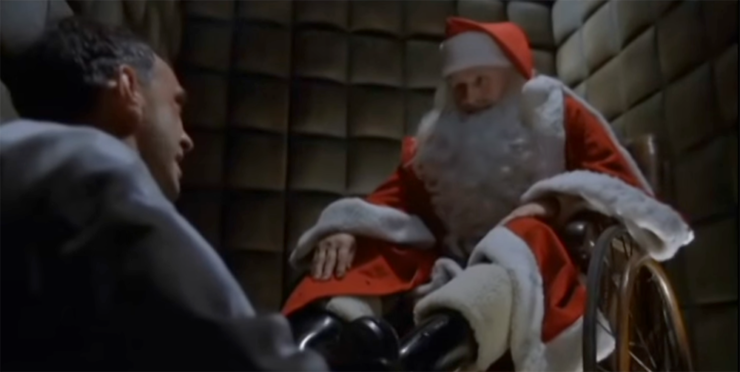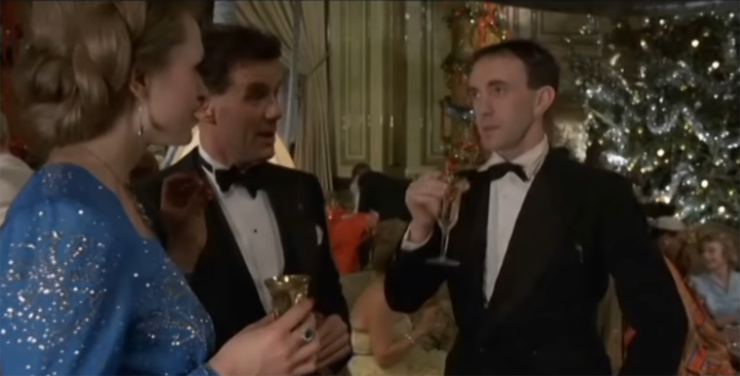Terry Gilliam’s 1985 comedy Brazil may take place in a dystopian country “[s]omewhere in the 20th century,” but it fully develops that setting in its first five minutes.
In the opening scenes, the camera pulls back from a tube television playing a commercial for designer ductwork to reveal a whole storefront display of TVs. As the commercial gives way to a chat show interview with Eugene Helpmann (Peter Vaughan), a high-ranking official in the Gestapo-like Ministry of Information, a bomb explodes, destroying the display and incinerating a passing shopper. As a match cut transitions us from the one television that survived the carnage to a TV set playing inside the concrete office of a nervous executive, we watch Helpmann answer a question about recent terrorist attacks. In contrast to the destruction we just witnessed, Helpmann speaks in warm paternalistic tones, dismissing the terrorists as “poor sports” while promising to further violate civil liberties in pursuit of security. Helpmann brings this fascistic nightmare to a conclusion with a comforting smile to the audience, wishing viewers “a very Merry Christmas to you all.”
In those first few moments, we understand the world of the movie. We see the dingy city, in which inconvenient mod-cons and the inscrutable laws grind down the hopes and joys of average citizens. We see the ways in which conventional English politeness and sense of propriety (qualities which also loom large throughout Monty Python’s comedic sketches and movies, though the satire is much darker here) and an unending war against invisible terrorists keep people both pacified and scared. And—almost as important—we see that it’s Christmastime.
That last point isn’t the afterthought it might appear to be. Although the holiday isn’t as central to the plot as it in, say, Elf, or Ernest Saves Christmas, or even Die Hard, Brazil is a Christmas movie. The holiday season has thematic resonance throughout the film’s narrative, helping to drive home the detachment and twisted logic that drives its dystopian world.

Christmas offers the country’s citizens a distraction from the violence and overall grimness of their everyday lives. Gilliam illustrates this in one of the film’s most effective comic sequences, in which our middle-aged middle-management hero Sam Lowry (Jonathan Pryce) meets with his wealthy socialite mother Ida (Katherine Helmond) and her friends for lunch in a swanky restaurant. Midway through the meal, another bomb goes off, maiming several waiters and patrons. We see bloody bodies stumbling away from the erupting flames, but no one at Sam’s table even notices. Instead, Ida gleefully declares, “I saw the most wonderful idea for presents at the chemist. Gift tokens! Surgical gift tokens!”
Although later scenes will reveal Ida to be as utterly callous and shallow as that comment suggests, her attitude is not unique in the world of Brazil. Nearly everyone chooses to focus on glossy tinsel and lush ivy instead of acknowledging their hopeless existence. Holiday music plays between propaganda announcements, shoppers carry their armloads of packages past the omnipresent police, and families read A Christmas Carol together until storm troopers attack
It’s hard to blame people for choosing the holiday over horror. Anyone in such a powerless situation would likely look for joy where they can find it, especially when their tormenter is so faceless, so omnipotent. Rituals have always been a way for people to making meaning of their lives, and when so much else is stripped away by the loss of autonomy and threat of sudden death, there’s all the more reason to retain one’s comforting customs and traditions.

However, Brazil also shows us how the oppressive government uses the trappings of Christmas to retain power. Not only does the holiday season serve as a useful distraction from the government’s cruelty, it also allows them to utilize seasonal rhetoric to their own ends. When a group of storm troopers find themselves with a few minutes of downtime, they don’t use it to reflect, to contemplate the human cost of their actions. Instead, they practice singing “The First Noel,” embracing the good feelings while blithely ignoring the people they’ve harmed and the kind of masters they serve; it’s a scene that underscores the banality of evil by presenting it to us wrapped in a cheery red seasonal bow. A more sinister example occurs late in the movie, when Mr. Helpmann comes to visit Sam in a cell, where he’s being held for aiding a women who has been labelled an enemy of the state. Dressed in a Santa outfit and speaking in an avuncular tone, Helpmann explains to Sam that the woman Jill (Kim Greist) has been killed, and that he will be tortured until he gives up the information the Ministry believes he has. After assuring Sam that all hope is lost, Helpmann exits the cell in a jolly mood, excited to dole out gifts to a group of orphans.
The sight of Helpmann as Santa is somehow more deeply horrifying than anything in a Christmas slasher film like Silent Night, Deadly Night. Unlike that killer Santa, Helpmann isn’t sick or deranged; he isn’t an obvious monster. He genuinely believes that he’s doing the right thing—that he’s accurately identified Sam as naughty for violating the law and his Ministry as nice for upholding it. He sees good deeds like gift-giving to orphans as clear evidence of virtue, even though his Ministry is likely responsible for making these children orphans in the first place. Christmas gives him language to extoll those virtues. He never questions the overt hypocrisy, the obvious harm that he’s causing—he is in power, so he must be right. Within the closed circuit of his reasoning, Helpmann is on the side of good, in his own mind, in spite of all the evidence to the contrary.
Helpmann’s self-delusion is aided by the fact that he doesn’t work alone. Brazil has no Big Brother, no President Snow, no one dictatorial leader ruling through a cult of personality. Instead, this is a regime of middle-managers, bureaucrats who erase humanity (their own and others) through paperwork and a highly regimented set of social conventions. The low-level pencil pushers and defenseless slum dwellers have no villain to blame because they are all implicated in the dehumanizing process: everyone is part of the same all-encompassing, oppressive system.

Helpmann’s decision to dress as Santa Claus isn’t a subversion of Christmas in this world, but rather an example of how it operates. Gift-giving not only lets Helpmann act out what he perceives to be his moral superiority, it also normalizes inhumane social structures by encouraging citizens to behave the same way. That’s why characters celebrate Sam’s promotion to an executive position within the Ministry of Information by all giving him the same useless tchotchke, each one wrapped in identical silver packaging. Even Jill, the character positioned as most outside the system, gives gifts to bribe government officials like Sam. The gifts themselves have no meaning attached to them, but the processes of giving them sends a clear message: I’m a good person and you’re one of us. It’s a purely transactional exchange.
Despite its portrayal of a seemingly all-powerful government, Brazil is ultimately a story about our ability to resist oppression through imagination. Occasionally (and somewhat unevenly), the film hints that Christmas could still play a part in this imaginative resistance, both in a romantic moment where gift-giving serves as foreplay and in a fantasy sequence involving a freedom fighter wearing a Santa mask. These moments don’t get a lot of attention within the film, and the former example does stink of sexism, but the movie’s overall message remains sound: as imaginative creatures, we humans still have the capacity to question, to create meaning, and to use our imagination to reach beyond the restraints of the power structures that limit our freedoms, whether they be totalitarian governments or rampant capitalism.
As demonstrated by the politically divisive Christmas-related screeds, self-serving corporate charity campaigns, and focus on the purely material aspects of shopping and commerce that have become a standard part of the seasonal landscape, the message of the holiday season can clearly be commercialized and cynically co-opted in our world, too, obscuring its more positive associations as a time to gather with family and friends, a time for giving and for helping others in need, a time to reflect on the past year and look to the future. And though it might never be considered a holiday classic, Brazil still serves as a powerful reminder that the human imagination is a force that cannot be controlled, no matter how dire the circumstances. Perhaps this year, we can that message to heart and thoughtfully consider our own humanity and what it means—what it costs us—to speak about and treat others in dehumanizing ways. Regardless of your faith or personal beliefs, December can be a time to take stock and imagine a better world, a more meaningful and less oppressive world, to which we can all contribute.
Joe George‘s writing has appeared at Think Christian, FilmInquiry, and is collected at joewriteswords.com. He hosts the web series Renewed Mind Movie Talk and tweets nonsense from @jageorgeii.










